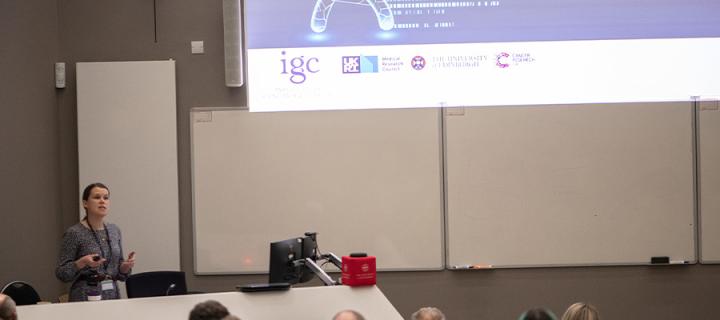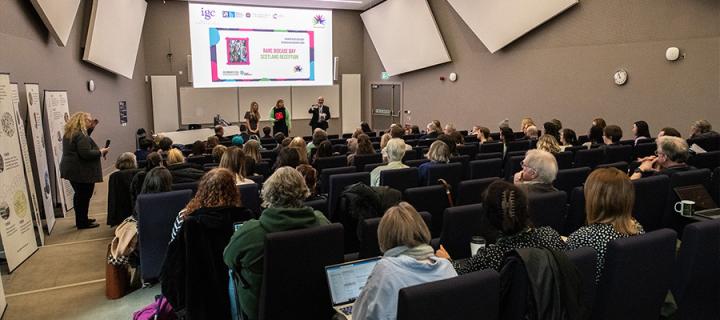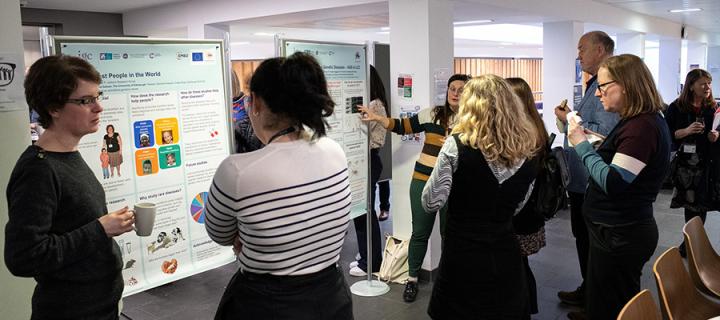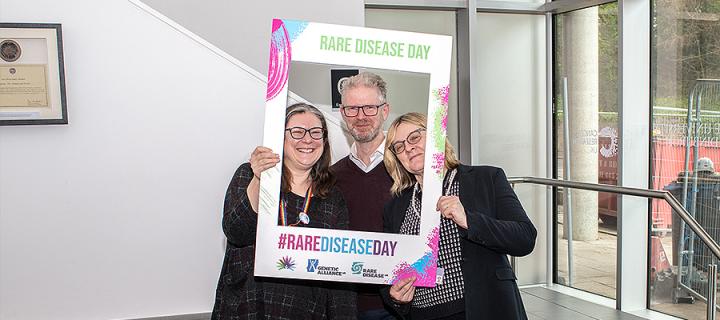Institute hosts Scotland Rare Disease Day Reception
Rare Disease UK, a Genetic Alliance UK campaign to raise awareness of rare diseases, marked International Rare Disease Day 2024 at the Institute on Tuesday 27 February.

Usually held at the Scottish Parliament, this year’s event took place at the Institute of Genetics and Cancer. The Institute has a longstanding relationship with Genetic Alliance UK which represents more than 200 patient organisations and charities.
In Scotland, around 400,000 people are affected by a rare condition. This means that about 1 in 17 people will be affected by a rare condition at some point in their lives.
Almost 100 attendees were welcomed including Minister for Public Health and Women's Health Jenni Minto MSP, Members of Scottish Parliament, representatives from Genetic Alliance UK member organisations, people living with and affected by rare diseases, and individuals from the rare disease research community.

The event was an opportunity to hear about current challenges facing people living with rare conditions in Scotland and to hear from the Minister about work being undertaken by the Scottish Government to implement the UK Rare Diseases Framework.

Attendees heard moving, personal accounts from the families of people living with Neurofibromatosis Type 1 and Epidermolysis Bullosa.
Professor Wendy Bickmore, Director of the MRC Human Genetics Unit, introduced the audience to rare genetic disease research at the Institute, explaining that, through improved understanding of the mechanisms behind rare genetic disease and of the experiences of people living with such conditions, knowledge unlocked by scientists will translate into faster, more accurate diagnosis and, ultimately, genomically-informed treatments.

Presentations by Professor Andrew Jackson and Dr Hannah Long followed, highlighting work into the interpretation of genetic variants for diagnosis by the Kudla and Marsh Labs, ciliopathies by the Mill Lab, and interferonopathies by the Crow Lab.
Professor Jackson went on to detail his group’s research into the genetics of microcephalic primordial dwarfism, and Dr Long informed attendees of research into the non-coding or ‘dark genome’. It is hoped that in the future the interpretation of DNA changes in the non-coding genome will allow us to understand their contribution to the development of disease.
Head of Molecular Genetics for NHS Lothian David Moore then gave an overview of the whole exome sequencing service in Scotland for children with severe developmental disorders.
Delegates also enjoyed the opportunity to network over research posters and refreshments.
Rare Disease Day provides an opportunity for people affected by a rare condition in Scotland to come together, share their experience and hear about important developments in policy, service delivery and research. Genetic Alliance UK were delighted to bring Rare Disease Day to IGC and to hear about the excellent work being undertaken to further knowledge and understanding of rare conditions. We look forward to working closely with the IGC to ensure that Scotland's rare conditions community can both hear about, and be involved in, the work of the IGC.
Although our work here is focussed on rare diseases, it has a much broader implication for human health. By studying rare disease we can also benefit the wider population.
With improved understanding of how changes to DNA can shape our appearance and contribute to disease we hope to improve the rates of diagnosis for patients and transform some of these findings to help inform management and treatment options for individuals with a rare disease diagnosis.


